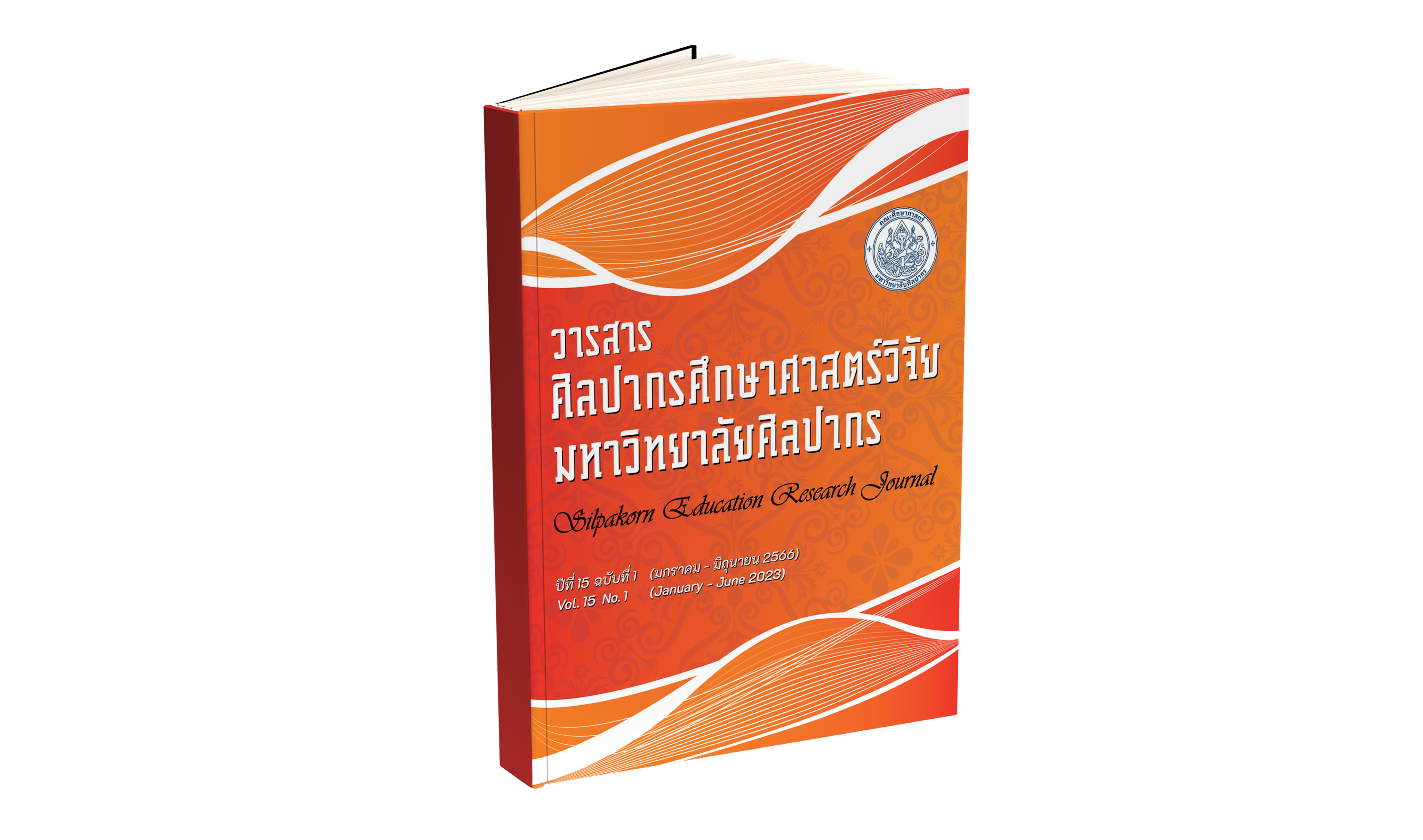ผลการจัดการเรียนรู้ด้วยสตีมศึกษาเพื่อแก้ปัญหาทางวิทยาศาสตร์และเจตคติทางวิทยาศาสตร์ของนักเรียนชั้นประถมศึกษาปีที่ 5
คำสำคัญ:
การจัดการเรียนรู้ด้วยสตีมศึกษา, การแก้ปัญหาทางวิทยาศาสตร์, เจตคติทางวิทยาศาสตร์บทคัดย่อ
การวิจัยครั้งนี้มีวัตถุประสงค์ 1. เพื่อเปรียบเทียบความสามารถในการแก้ปัญหาทางวิทยาศาสตร์ก่อนเรียนและหลังเรียนของนักเรียนที่ได้รับการจัดการเรียนรู้สตีมศึกษาขอชั้นประถมศึกษาปีที่ 5 2. เพื่อเปรียบเทียบ
ความสามารถในการแก้ปัญหาทางวิทยาศาสตร์ของนักเรียนที่ได้รับการจัดการเรียนรู้ด้วยสตีมศึกษาเมื่อเทียบกับเกณฑ์ (ร้อยละ 60) 3. เพื่อศึกษาเจตคติทางวิทยาศาสตร์ของนักเรียนก่อนเรียนและหลังเรียนที่ได้รับการจัดการเรียนรู้ด้วยสตีมศึกษาของนักเรียนชั้นประถมศึกษาปีที่ 5 4. เพื่อเปรียบเทียบเจตคติทางวิทยาศาสตร์ของนักเรียนหลังเรียนที่ได้รับการจัดการเรียนรู้ด้วยสตีมศึกษาเมื่อเทียบกับเกณฑ์ (3.5) แบบแผนที่ใช้ในการวิจัย คือ แบบการทดลองกลุ่มเดียวแบบวัดซ้ำ กลุ่มตัวอย่างที่ใช้ในการวิจัย คือ นักเรียนชั้นประถมศึกษาปีที่ 5 โรงเรียนประถมนนทรีเขตยานนาวา กรุงเทพมหานคร ภาคเรียนที่ 1 ปีการศึกษา 2565 จำนวน 25 คน ที่ได้จากการสุ่มแบบกลุ่มเครื่องมือที่ใช้ในการวิจัย คือ 1. แผนการจัดการเรียนรู้ด้วยสตีมศึกษา 2. แบบทดสอบความสามารถในการแก้ปัญหาทางวิทยาศาสตร์ 3. แบบวัดเจตคติทางวิทยาศาสตร์ สถิติที่ใช้ในทดสอบสมมติฐานได้แก่ การทดสอบค่าที (t-test for dependent samples, t-test for one samples) ผลการวิจัยพบว่า 1.นักเรียนที่ได้รับการจัดการเรียนรู้ด้วยสตีมศึกษามีความสามารถในการแก้ปัญหาทางวิทยาศาสตร์หลังเรียนสูงกว่าก่อนเรียนและสูงกว่าเกณฑ์ที่กำหนด (ร้อยละ 60) อย่างมีนัยสำคัญทางสถิติที่ระดับ .01 2. นักเรียนมีเจตคติทางวิทยาศาสตร์หลังเรียนสูงกว่าก่อนเรียนและมีเจตคติทางวิทยาศาสตร์สูงกว่าเกณฑ์อย่างมีนัยสำคัญทางสถิติที่ระดับ .01 (3) นักเรียนที่เรียนด้วย สตีมศึกษามีเจตคติทางวิทยาศาสตร์ที่สูงขึ้นอย่างมีนัยสำคัญทางสถิติที่ระดับ .01 และอย่างมีนัยสำคัญทางสถิติที่ระดับ .01 และ (4) นักเรียนที่เรียนด้วยสตีมศึกษามีเจตคติทางวิทยาศาสตร์ที่สูงขึ้นอย่างมีนัยสำคัญ ทางสถิติที่ระดับ .01 และเป็นไปตามเกณฑ์ที่กำหนด (3.5)
เอกสารอ้างอิง
Benchapich, F. and Pariput, P. (2020).“The Development of Early Childhood Children’s Problem Solving Ability through Learning Activity Package Based on STEAM Education”. Journal of Roi Et Rajabhat University. 14(2). (in Thai)
ChanPrasert, S. (2014). “Advancing in the 21st Century STEM Education.” Journal of Industrial Education 142(186). IPST Magazine. (in Thai)
Hyoungbum Kim. (1965). “Development and Application of STEAM Programs Based on Traditional Korean Culture Eurasian Mathematics”. Journal Science and Technology Education 22(7): 1925-1936.
Kongsilp, N. (2018). “STEAM The Development an Elementary Curriculum for Global Learning by Using STEAM”. Journal of Industrial Education 12(2). (in Thai)
Kinawong, C. (1984). Science for Elementary School Teachers. (in Thai)
Nawong, C. (1984). Principles of Teaching Science to Enhance Experience.Bangkok: Srinakharinwirot University. (in Thai)
Ounsrimuang, W. (2011). A Comparison of Science Learning Achievement and Science Problem Solving Ability of Mathayomsuksa 3 Students Receiving Cooperative Learning using STAD Technique and Cooperative Learning Management using LT Technique. Master of Science Thesis Program in Faculty of Science Srinakharinwirot University. (in Thai)
Olapiriyakul, S. (2018). “STEAM Education: Innovative Education Integrated into Learning Management”. Curriculum Research and Development Journal 9(1): 3. (in Thai)
Promta, P. (2018). Development of STEAM Activityon “Chemical Bonding: Waterproof Cotton” to Enhance Creative Thinking and Innovation Skills for High School Students. Master of Science Thesis Program in Faculty of Science Srinakharinwirot University. (in Thai)
Pholmool, J. (2015). The Development of STEAM Integrated Learning Unit for Ninth Grade Students. Master of Science Thesis Program in Faculty of Science Srinakharinwirot University. (in Thai)
Praditsakul, P. (2018). For Example, the Context of Steam About Rice Fields for Help in Solving Problems with Critical thinking has a Rational Problem-Solving Function and Happiness in Learning Request a Follow-up Class Every Year 3. Master of Science Thesis Program in Faculty of Science Srinakharinwirot University. (in Thai)
Pongen, W. (2018). “The Learning Outcomes of STEAM Education Based on Problem Based Learning to Developing Mathematical Skills and Process for Seventh Grade Students”. Journal of Education Studies (47)1: 526-543. (in Thai)
Phothirangsiyakorn, R. (2018). The Effects of Project-Based Social Learning Management with Satay Education Concepts on Creativity and Achievement of Mathayomsuksa 5 Students. Master of Science Thesis Program in Faculty of Science Srinakharinwirot University. (in Thai)
Piaget, (2020). Understand Your Child's Nature with Piaget's Theory of Age-Based CognitiveDevelopment. [Online]. Retrieved November 1, 2022, from https://www. parentsone. com/intro-piagets-theory-of-cognitive-development/.
Sinthapanont, S. (2015). Learning Management of Modern Teachers--to Develop Learner Skills. Bangkok: Chulalongkorn University. (in Thai)
Thaengnoi, P. (2016). Delvelopment of Science Learning Model on Strand 6: Change Processe of Earth to Promote Scientific Concepts and Scientific Problem-Solving Abilities for Mathayomsuksa Students. Srinakharinwirot University. (in Thai)
Thatthong, K. (2002). Science Teaching Behavior. Bangkok: Institute for Academic Quality Development. (in Thai)
The Institute for the Promotion of Teaching Science and Technology. (2013). Guide to Using the Curriculum for Learning Subjects Science for Future Courses Secondary 1. Bangkok: Suksapan. (in Thai)
The Institute for the Promotion of Teaching Science and Technology. (2018). Guide to Using the Curriculum for Learning Subjects Science for Future Courses Secondary 1. Bangkok: Suksapan. (in Thai)
Taweewong na Ayutthaya, (1994). Unit 5 Developing the Pursuit of Scientific Knowledge in the Collection of Subject Matter Series and Scientific Methods. Nonthaburi: Department of Education Sukhothai Thammathirat Open University. (in Thai)
Wechyalak, N. (2018). Principles of Learning Management. (1st edition). Bangkok: Chulalongkorn University Press.
Wiboontanasrn, T. (2018). Develoment of Steam Education Activity Package Skills on Leraning and Innovation for High School. Master of Science Thesis Program in Faculty of Science Srinakharinwirot University. (in Thai)





